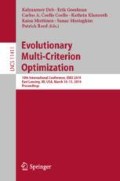Abstract
Hypervolume-based algorithms are not widely used for solving many-objective optimization problems due to the bottleneck of hypervolume computation. Approximation methods can alleviate the problem and are discussed and tested in this work. Several MOEAs are considered, but after pre-experimental tests, only two variants of SMS-EMOA are considered further. These algorithms are compared to NSGA-III, a reference-based algorithm. The results show that SMS-EMOA with hypervolume approximation is viable for many-objective optimization problems and is faster in convergence towards the Pareto-front.
Access this chapter
Tax calculation will be finalised at checkout
Purchases are for personal use only
References
Agrawal, R.B., Deb, K.: Simulated binary crossover for continuous search space. Complex Syst. 9(2), 115–148 (1995)
Bader, J., Zitzler, E.: Hype: an algorithm for fast hypervolume-based many-objective optimization. Evol. Comput. 19(1), 45–76 (2011)
Beume, N., Naujoks, B., Emmerich, M.: SMS-EMOA: multiobjective selection based on dominated hypervolume. Eur. J. Oper. Res. 181(3), 1653–1669 (2007)
Biscani, F., Izzo, D.: esa/pagmo2: pagmo 2.8 (2018). https://doi.org/10.5281/zenodo.1311209
Bringmann, K., Friedrich, T.: Approximating the volume of unions and intersections of high-dimensional geometric objects. Comput. Geom. 43(6), 601–610 (2010)
Bringmann, K., Friedrich, T.: Approximating the least hypervolume contributor: NP-hard in general, but fast in practice. Theor. Comput. Sci. 425, 104–116 (2012)
Deb, K., Jain, H.: An evolutionary many-objective optimization algorithm using reference-point-based nondominated sorting approach, part I: solving problems with box constraints. Trans. Evol. Comput. 18(4), 577–601 (2014)
Deb, K., Pratap, A., Agarwal, S., Meyarivan, T.: A fast and elitist multiobjective genetic algorithm: NSGA-II. Trans. Evol. Comput. 6(2), 182–197 (2002)
Deb, K., Thiele, L., Laumanns, M., Zitzler, E.: Scalable multi-objective optimization test problems. In: Congress on Evolutionary Computation (CEC), pp. 825–830. IEEE Press, Piscataway (2002)
Emmerich, M., Beume, N., Naujoks, B.: An EMO algorithm using the hypervolume measure as selection criterion. In: Coello Coello, C.A., Hernández Aguirre, A., Zitzler, E. (eds.) EMO 2005. LNCS, vol. 3410, pp. 62–76. Springer, Heidelberg (2005). https://doi.org/10.1007/978-3-540-31880-4_5
Glasmachers, T., Naujoks, B., Rudolph, G.: Start small, grow big? Saving multi-objective function evaluations. In: Bartz-Beielstein, T., Branke, J., Filipič, B., Smith, J. (eds.) PPSN 2014. LNCS, vol. 8672, pp. 579–588. Springer, Cham (2014). https://doi.org/10.1007/978-3-319-10762-2_57
Huband, S., Hingston, P., Barone, L., While, L.: A review of multiobjective test problems and a scalable test problem toolkit. Trans. Evol. Comput. 10(5), 477–506 (2006)
Hughes, E.J.: Multiple single objective Pareto sampling. In: Congress on Evolutionary Computation (CEC), vol. 4, pp. 2678–2684. IEEE Press, Piscataway (2003)
Hughes, E.J.: MSOPS-II: a general-purpose many-objective optimiser. In: Congress on Evolutionary Computation (CEC), pp. 3944–3951. IEEE Press, Piscataway (2007)
Igel, C., Hansen, N., Roth, S.: Covariance matrix adaptation for multi-objective optimization. Evol. Comput. 15(1), 1–28 (2007)
Ishibuchi, H., Tsukamoto, N., Nojima, Y.: Evolutionary many-objective optimization: a short review. In: Congress on Evolutionary Computation (CEC), pp. 2419–2426. IEEE Press, Piscataway (2008)
Ishibuchi, H., Tsukamoto, N., Sakane, Y., Nojima, Y.: Indicator-based evolutionary algorithm with hypervolume approximation by achievement scalarizing functions. In: Genetic and Evolutionary Computation (GECCO), pp. 527–534. ACM, New York (2010)
Jain, H., Deb, K.: An improved adaptive approach for elitist nondominated sorting genetic algorithm for many-objective optimization. In: Purshouse, R.C., Fleming, P.J., Fonseca, C.M., Greco, S., Shaw, J. (eds.) EMO 2013. LNCS, vol. 7811, pp. 307–321. Springer, Heidelberg (2013). https://doi.org/10.1007/978-3-642-37140-0_25
Kramer, O.: A review of constraint-handling techniques for evolution strategies. Appl. Comput. Intell. Soft Comput. 3:1–3:19 (2010)
Li, M., Yang, S., Liu, X., Shen, R.: A comparative study on evolutionary algorithms for many-objective optimization. In: Purshouse, R.C., Fleming, P.J., Fonseca, C.M., Greco, S., Shaw, J. (eds.) EMO 2013. LNCS, vol. 7811, pp. 261–275. Springer, Heidelberg (2013). https://doi.org/10.1007/978-3-642-37140-0_22
Qi, Y., Ma, X., Liu, F., Jiao, L., Sun, J., Wu, J.: MOEA/D with adaptive weight adjustment. Evol. Comput. 22(2), 231–264 (2014)
Tang, W., Liu, H., Chen, L.: A fast approximate hypervolume calculation method by a novel decomposition strategy. In: Huang, D.-S., Bevilacqua, V., Premaratne, P., Gupta, P. (eds.) ICIC 2017. LNCS, vol. 10361, pp. 14–25. Springer, Cham (2017). https://doi.org/10.1007/978-3-319-63309-1_2
Voß, T., Hansen, N., Igel, C.: Improved step size adaptation for the MO-CMA-ES. In: Genetic and Evolutionary Computation (GECCO), pp. 487–494. ACM, New York (2010)
Wagner, T., Beume, N., Naujoks, B.: Pareto-, aggregation-, and indicator-based methods in many-objective optimization. In: Obayashi, S., Deb, K., Poloni, C., Hiroyasu, T., Murata, T. (eds.) EMO 2007. LNCS, vol. 4403, pp. 742–756. Springer, Heidelberg (2007). https://doi.org/10.1007/978-3-540-70928-2_56
Zhang, Q., Li, H.: MOEA/D: a multiobjective evolutionary algorithm based on decomposition. Trans. Evol. Comput. 11(6), 712–731 (2007)
Zitzler, E., Brockhoff, D., Thiele, L.: The hypervolume indicator revisited: on the design of pareto-compliant indicators via weighted integration. In: Obayashi, S., Deb, K., Poloni, C., Hiroyasu, T., Murata, T. (eds.) EMO 2007. LNCS, vol. 4403, pp. 862–876. Springer, Heidelberg (2007). https://doi.org/10.1007/978-3-540-70928-2_64
Acknowledgments
This work is funded by the European Commission’s H2020 programme through the UTOPIAE Marie Curie Innovative Training Network, H2020-MSCA-ITN-2016, under Grant Agreement No. 722734 as well as through the Twinning project SYNERGY under Grant Agreement No. 692286.
Author information
Authors and Affiliations
Corresponding author
Editor information
Editors and Affiliations
Rights and permissions
Copyright information
© 2019 Springer Nature Switzerland AG
About this paper
Cite this paper
Irawan, D., Naujoks, B. (2019). Comparison of Reference- and Hypervolume-Based MOEA on Solving Many-Objective Optimization Problems. In: Deb, K., et al. Evolutionary Multi-Criterion Optimization. EMO 2019. Lecture Notes in Computer Science(), vol 11411. Springer, Cham. https://doi.org/10.1007/978-3-030-12598-1_22
Download citation
DOI: https://doi.org/10.1007/978-3-030-12598-1_22
Published:
Publisher Name: Springer, Cham
Print ISBN: 978-3-030-12597-4
Online ISBN: 978-3-030-12598-1
eBook Packages: Computer ScienceComputer Science (R0)

